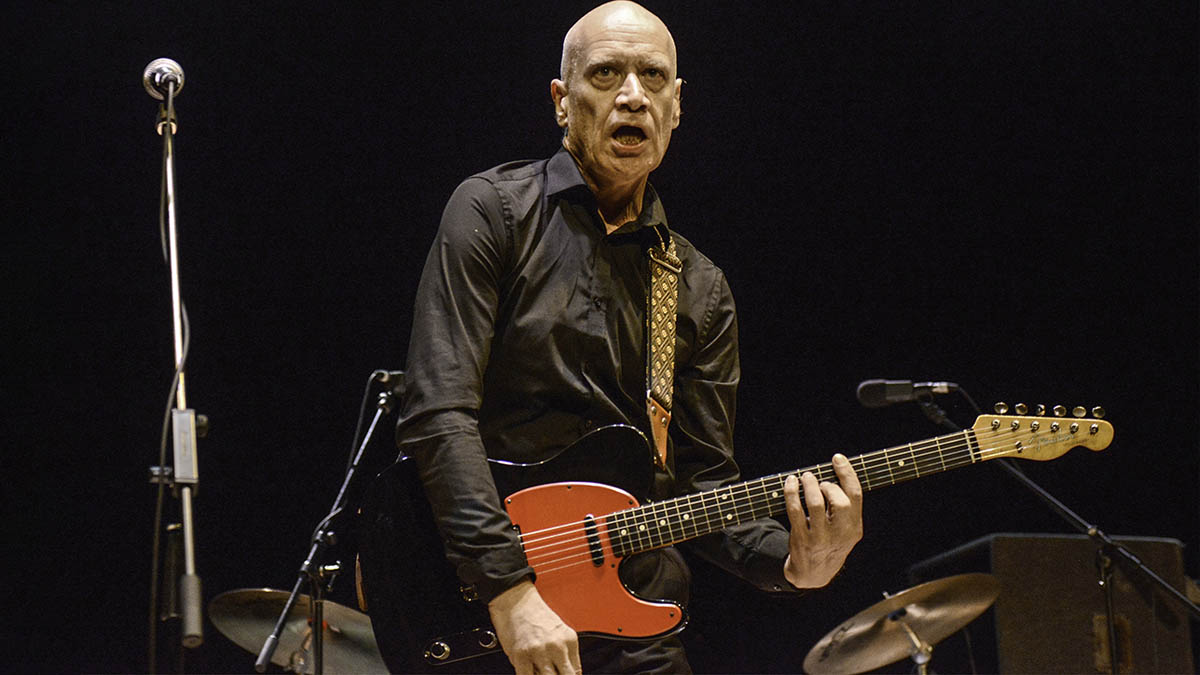Paying tribute to Wilko Johnson 1947-2022: the hard-hitting rhythm king who shaped the sound of UK punk
An unlikely guitar hero, Johnson had a style like no other, and wielded his Tele like a machine gun – the punks and more were paying attention to his sound and stage presence

On November 21, 2022, Wilko Johnson passed away at the age of 75. The Essex-born guitarist and singer was best known for his role in Dr. Feelgood, with his electrifying guitar work on celebrated tracks such as Back In The Night, Roxette and She Does It Right, and his unique on-stage persona.
As Paul Weller once commented: “Wilko may not be as famous as some other guitarists, but he’s right up there. And there are a lot of people who’ll say the same. I can hear Wilko in lots of places. It’s some legacy.”
Wilko was born John Peter Wilkinson on July 12, 1947 in Canvey Island, Essex, and discovered guitar almost by accident. As he told Total Guitar: “One day, I saw an electric guitar at school, and I was fascinated. I didn’t know anything about music, I just liked the look of this thing.
“I’m left-handed, so my first electric – I don’t remember its name – was left-handed. But it was terrible. The action was about an inch above the fretboard, so every time you tried to play a note, you got this kind of Chinese finger torture. I was useless. Everyone at school was better than me.”
Nevertheless, he played in several local bands before studying English Language And Literature at the University Of Newcastle upon Tyne. He then went travelling in India before returning to Essex to perform in the Pigboy Charlie Band, which became the foundation for Dr. Feelgood to form in 1971.
It has been reported that Wilko bought his first Fender Telecaster from a shop in Southend in 1965, which set him back £90. Around the time Dr. Feelgood were signing their first record deal, he bought a 1962 sunburst Telecaster with a white pickguard, which he had refinished in black with a red pickguard swapped in.
This would become the instrument he was most known for playing – and the guitar that inspired his signature Fender Telecaster, released in 2013, which featured a 7.25” radius rosewood fingerboard with 21 vintage-style frets, three-way pickup switching, a vintage-style string-through-body bridge with three chrome-barrel saddles, and vintage-style tuners.
All the latest guitar news, interviews, lessons, reviews, deals and more, direct to your inbox!
Special in-case extras included two photos and facsimiles of the notebook pages on which Wilko penned She Does It Right and other Dr. Feelgood hits. As he said when the signature was released: “It’s great to know people will be able to play an instrument just like the one that has served me so well throughout my career.”
There were many reasons why Wilko Johnson ended up becoming hugely influential within the UK’s pub rock scene and the wave of punk that soon followed. His appearance certainly left a long-lasting impression wherever he went, thanks to that thousand-yard stare, the iconic ‘machine gun’ poses with his guitar raised up to shoulder level and the unforgettable ‘duck walks’ across the stage while suited and booted in black.
But it was his no-nonsense raw and aggressive tone that inspired so many who came after him – embracing the ear-piercing twang of a Telecaster while also adding more warmth and percussive punch with his fingers instead of a guitar pick. It was a style unlike any other, fusing rhythm and lead parts into one towering guitar sound that, especially for its time, felt more like two players going head-to-head than the work of one single axeman.
It was this Bo Diddley-inspired approach that became the driving force behind Dr. Feelgood’s first four albums – Down By The Jetty, Malpractice, live record Stupidity and Sneakin’ Suspicion – released between 1975 and 1977.
“When we started Dr. Feelgood, we wanted to excite audiences,” Wilko told TG in 2016. “Our singer Lee Brilleaux was an absolute natural: he had a kind of nervous energy, that was his personality. And when he got on stage, there was a kind of violence about him.
“I took my cue from that, and bounced off Lee. We found out that if you’re playing rock ’n’ roll, whizzing about a bit and holding your guitar like you’re shooting a machine gun, then it excites audiences. That’s purely what it was about. The guitar makes a good pretend machine gun. It’s built for that.”
After creative differences with his bandmates came to a head during the sessions for Sneakin’ Suspicion, Wilko’s final album with the group, he stated he was given his marching orders and his tenure in Dr. Feelgood came to an abrupt end – although the other members disputed this, claiming that the guitarist left of his own volition.
The following year, Wilko returned with the self-titled debut of his new group Solid Senders. It would be their only release, after which he’d start to focus more on his own group, The Wilko Johnson Band, with whom he’d release the majority of his life’s work.
“My guitar playing is very simple,” he once humbly revealed. “It can be explained in five minutes, and it’s served me all this time. I can play three chords, and 12 bars, and back that whole thing up with a bit of machine gun. And that’s it. It’s simple. But it works.
If you put on a determined expression and play loud, people are convinced. I don’t rehearse. I don’t practise at home
Wilko Johnson
“If you put on a determined expression and play loud, people are convinced. I don’t rehearse. I don’t practise at home. The only time I pick my guitar up is when I walk onstage. So that’s how technical I am. I don’t think people come to see me to hear any marvellous musical innovations.”
Other key releases from his career include contributions to Mick Farren’s 1978 album Vampire Stole My Lunch Money and two guest spots on Johnny Thunders’ 1985 album Que Sera Sera. Wilko joined Ian Dury & The Blockheads for their 1980 album Laughter, having originally considered retiring from the industry before being convinced by Dury to replace Chaz Jankel.
Wilko joined Robert Fripp, Peter Hammill and Robert Smith as a guest star for The Stranglers And Friends: Live In Concert, released in 1995 some 15 years after the event took place.
In January 2013, Wilko was diagnosed with late stage pancreatic cancer and chose not to receive any chemotherapy. He had been given nine or ten months to live – during which time he embarked on a farewell tour of the UK and even managed to partner up with The Who’s singer Roger Daltrey for the album Going Back Home, which reached number three on the UK album charts.
Wilko revealed at the time that he believed Going Back Home would be “the last thing [he] ever did”. However, the original diagnosis was incorrect and Wilko had actually been suffering from a less aggressive and more treatable form of the disease.
After undergoing an 11-hour operation removing parts of his pancreas, spleen and intestines, he announced he was cancer-free and getting used to life knowing that death was “not imminent”. He would live almost a decade longer than the doctors had initially given him. And although he’s no longer with us now, there can be no doubt that his music and guitar sound will echo for an eternity.
Amit has been writing for titles like Total Guitar, MusicRadar and Guitar World for over a decade and counts Richie Kotzen, Guthrie Govan and Jeff Beck among his primary influences as a guitar player. He's worked for magazines like Kerrang!, Metal Hammer, Classic Rock, Prog, Record Collector, Planet Rock, Rhythm and Bass Player, as well as newspapers like Metro and The Independent, interviewing everyone from Ozzy Osbourne and Lemmy to Slash and Jimmy Page, and once even traded solos with a member of Slayer on a track released internationally. As a session guitarist, he's played alongside members of Judas Priest and Uriah Heep in London ensemble Metalworks, as well as handled lead guitars for legends like Glen Matlock (Sex Pistols, The Faces) and Stu Hamm (Steve Vai, Joe Satriani, G3).

